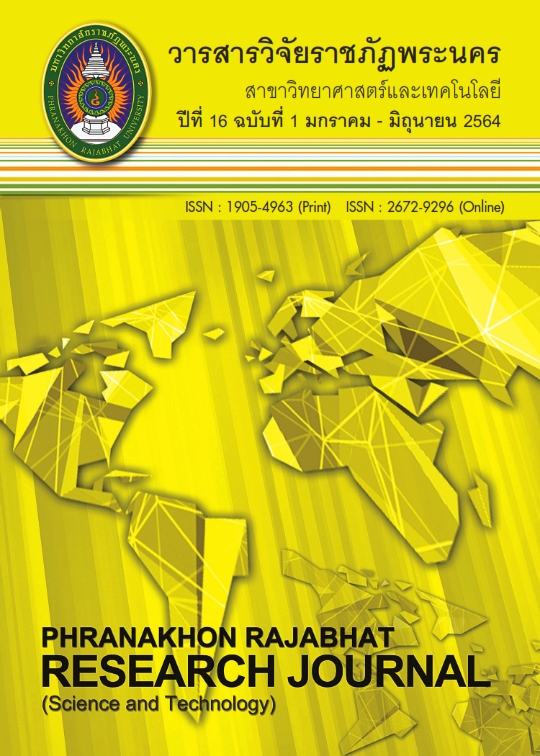PREVALENCE OF COGNITIVE IMPAIRMENT AND ABILITY TO PERFORM ACTIVITIES OF DAILY LIVING AMONG THE ELDERLY IN MUANG DISTRICT, CHANTABURI
Keywords:
Dementia, Prevalence, Elderly, Community, Activities of Daily LivingAbstract
The purpose of this cross-sectional research was to explore the prevalence of cognitive impairment and the ability to perform activities of daily living. A total of 314 elderly living in Muang district, Chantaburi was recruited using purposive sampling. The data collection tools composed of demographic data questionnaire, The Mental Status Examination Thai (MSET10), The Montreal
Cognitive Assessment (MoCA), The Barthel Index for Activities of Daily Living, Chula ADL index, and
The two-item depression screening test. The data were analyzed using descriptive statistics. The
results revealed that
1. The prevalence of cognitive impairment among the elderly using MoCA screening was 85.03 percent and MSET10 was 6.05 percent
2. Both normal and expected dementia elderly were independent in basic activities of daily living 100 percent. Among normal and expected dementia elderly were totally dependent on instrumental activities of daily living 3.73 and 21.05 respectively, moderate dependent 12.20 and 47.37 respectively, and independent living in the community 84.07 and 31.58 respectively.
As a results, health care provider should create activities to promote the ability of cognition,
the ability to remember, the ability of response, attention and exclusive function training for the
elderly in the community in order to maintain the ability to perform activities of daily living of the
elderly.
References
Aekplakorn, W. (Ed.). (2014). Thai National Health Examination (Survey, NHES V). Nonthaburi: Health
System Research Institue. (in Thai).
Aroonsang, P., Sritanyarat, W., Lertrat, P., Subindee, S., Surit, P. & Theeranut, A. (2012). Health profile
of older persons in health care institute and in community. Journal of Nursing Science and Health, 35(2), 15-24. (in Thai).
Ashford, J. W., Borson, S., O’Hara, R., Dash, P., Frank, L. & Robert, P. (2006). Should older adults be screened for dementia?. Alzheimer’s and Dementia, 2, 76-85.
Baumgart, M., Snyder, H. M., Carrillo, M. C., Fazio, S., Kim, H., & Johns, H. (2015). Summary of the
evidence on modifiable risk factors for cognitive decline and dementia. A populationbased perspective. Alzheimer’s and Dementia, 11(6), 718–726.
Boonkerd, P. (2018). The dementia association newsletter. Retrieved from http://www.thaidementia.
org/core/File/839.pdf. [2018, 3 Oct.]
Boyle, P. A., Cohen, R. A., Paul, R., Moser, D., & Gordon, N. (2002). Cognitive and motor impairments
predict functional declines in patients with vascular dementia. International Journal of Geriatric Psychiatry, 17, 164–169.
Bradford, A., Kunik, M. E. M., Schulz, P., Williams, S. P. S., & Singh, H. (2009). Missed and delayed
diagnosis of dementia in primary care: prevalence and contributing factors. Alzheimer Disease and Associated Disorders, 23(4), 306–314.
Caddell, L. S., & Clare, L. (2011). The impact of dementia on self and identity: a systematic review.
Clinical Psychology Review, 30(1), 113-126.
Chantaburi Provincial Statistical Office. (2017). Mind map and data file of elderly information. Retrieved from http://chanthaburi.nso.go.th/index. [2018, 22 August.]
Diniz, B. S., Butters, M. A., Albert, S. M., Dew, M. A., & Reynolds, C. F. (2013). Late-life depression and
risk of vascular dementia and Alzheimer’s disease: Systematic review and meta-analysis of
community-based cohort studies. British Journal of Psychiatry, 202(5), 329–335.
Foundation of Thai Gerontology Research and Development Institute. (2017). Situation of the
Thai Elderly 2016. Bangkok: Printery CO; LTD. (in Thai).
Gauthier, S., Reisberg, B., Petersen, R. C., & Essig, M. (2006). Mild cognitive impairment. The Lancet,
(9518), 1262–1270.
Institute for Population and Social Research. (2019). Population of Thailand 2018. Retrieved from
http://www.ipsr.mahidol.ac.th/ipsrbeta/th/Gazette.aspx. [ 2018, 15 August.]
Jefferson, A. L., Byerly, L. K., Vanderhill, S., Lambe, S., Wong, S., Ozonoff, A., & Karlawish, J. H. (2008).
Characterization of Activities of Daily Living in Individuals with Mild Cognitive Impairment. American Association for Geriatric Psychiatry, 16(5), 375–383.
Jeke, K., Damian, K., Wattmo, C., Hausner, L., Bullock, R., & Connelly, P. J. (2015). Mild cognitive
impairment and deficits in instrumental activities of daily living: a systematic review.
Alzheimer’s Research and Therapy, 7(17), 1-20.
Luis, C.A., Keegan, A. P., & Mullan, M. (2009). Cross validation of the Montreal Cognitive Assessment
in community dwelling older adults residing in the Southeastern US. International Journal
of Geriatric Psychiatry, 24(2), 197-201.
Mograbi, D. C., Faria, C., de, A., Fichman, H. C., Paradela, E. M. P., & Lourenço, R. A. (2014). Relationship
between activities of daily living and cognitive ability in a sample of older adults with
heterogeneous educational level. Annals of Indian Academy of Neurology, 17, 71–76.
Nuysri, M. (2016). The prevention of dementia. Journal of the Police Nurse, 8(1), 227-240.
Petersen, R. C., Doody. R., Kurz, A., Mohs, R. C., Morris, J. C., & Rabins, P. V. (2001). Current concepts
in mild cognitive impairment. Archives of neurology, 58(12), 1985-1992.
Praison, P., & Chuajedton, P. (2017). Factors related to mild cognitive impairments in elderly people
in Chiang Rai province. Thai Journal of Nursing Council, 32(1), 64-80.
Saunders, N. L., & Summers, M. J. (2011). Longitudinal deficits to attention, executive, and working memory in subtypes of mild cognitive impairment. Neuropsychology, 25(2), 237-348.
Schoenmakers, B., Buntinx, F., & Delepeleire, J. (2010). Factors determining the impact of care-giving
on caregivers of elderly patients with dementia. A systematic literature review. Maturitas, 66(2), 191–200.
Sun, Y., Lee, H. J., Yang, S. C., Chen, T. F., Lin, K. N., Lin, C. C., & Chiu, M. J. (2014). A nationwide
survey of mild cognitive impairment and dementia, including very mild dementia, in Taiwan. PLoS One, 9(6), 100-303.
Suwan, A., & Trakulsithichoke, S. (2016). Prevalence and factors associated with dementia among
elderly in Lukhok subdistrict, Muang district, Pathumtani province. APHEIT Journal, 5(2), 21-32
Trakulsithichoke, S. (2018). Prevention of dementia in older persons. Journal of Nursing and Health
care, 36(4), 6-14.
Xu, W.L., Atti, A.R., Gatz, M., Pedersen, N.L., Johansson, B., & Fratiglioni, L. (2011). Midlife overweight
and obesity increase late-life dementia risk: A population-based twin study. Neurology,
(18), 1568-1574
Downloads
Published
Issue
Section
License
โปรดกรอกเอกสารและลงนาม "หนังสือรับรองให้ตีพิมพ์บทความในวารสารวิจัยมหาวิทยาลัยราชภัฏพระนคร สาขาวิทยาศาสตร์และเทคโนโลยี" ก่อนการตีพิมพ์




